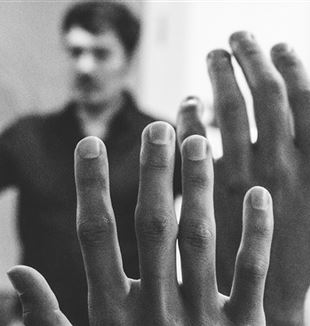
A well of fresh water
Nicola had gone to meet the GS students without expecting anything. But a phrase by Chesterton about “answering riddles” took flesh. “I can quench my thirst again.”At a certain point, you get to a particular age (56 years), and you feel like you have seen and experienced everything. A fifth grader, Giorgio, sent everyone the invitation to School of Community worksheet on whatsapp. I prepared the hall where we meet, the thermometer and the hand sanitizer, with which Giovanni "welcomed" his friends. Lucia collected the parents’ consent forms so that people could participate in the gesture. We are in Covid mode. We sat more than a meter apart from each other, with masks. But inside me it was as if I had already seen everything. I didn't expect anything, just another meeting with the GS students.
This week’s worksheet proposed a phrase by Chesterton: "The trouble with our sages is not that they cannot see the answer; it is that they cannot even see the riddle.” The young people unexpectedly (as always, after all) began to intervene. Some we encourage, others start talking from within, from the heart. Elena talked about the questions that have arisen since the beginning of the academic year: "I feel inadequate in front of the rest of the class, the teachers. I feel a disproportion and I do not feel good." Samuele said: "In class we watched The Name of the Rose, the part where they talk about how the books are forbidden because they lead us away from faith. Doubts and questions, our teacher told us, are the enemy of faith. They move us away from faith. Instead, my experience is that questions strengthen faith. Asking yourself questions about what makes you happy is the best thing. I haven’t stopped asking myself questions, even after watching a movie, because I want to live my life with awareness.
The dialogue lit up. Giorgio said that during this period he has realized that he felt good, that he felt calm and in some ways superior to others, because his own ideas and the certainty he lives. Then, on Sunday, he went to Mass again after a long time. When he heard what the priest was saying, he suddenly understood that it is much better to be open to what is happening, to people, to know how to ask questions and learn about everything. To feel humble and not without need for anything. In short, he understood that he absolutely did not see the riddle.
Lucia said that she shares this openness, this sense of riddle. "But why, then, do I desire tranquility, my comfort zone, happiness?" Betta jumped in: "I am experiencing that questions about faith are a good thing. Why do I have to believe in God? Why do I have to think that this is good for me? Why do I have to go to Mass? I have not discovered it myself! I began GS because my family is in the movement. But my father had begun to go to GS because he believed in it, it was his discovery. I want to discover if this road is for me with my own eyes. I want to see if it is for me.
Taken totally by this dialogue I intervened: "But for you, does asking all these questions make life more beautiful, more intense, or uglier and more difficult? And she said: "Absolutely more beautiful. Without this there is no happiness." I replied, "Precisely this is important, this evidence. One only lives peacefully and without riddles when you are surrounded by something that is not interested. A thing or a person does not create riddles for you, it only leaves you calm when you are not interested. When, on the other hand, there is a very beautiful person next to you, that you like so much, that interests you, you cannot but feel disproportionate, full of questions. You cannot but feel the enigma. But that is what makes you feel alive, not feel calm".
Read also – Kids who, without asking, ask everything
I tell them, in two jokes, but I see it's happening to me again.
I had gone there completely closed off, not expecting anything beyond my thoughts. Instead I found myself in front of a water gushing again. These GS students carry in them an infinite well that contains fresh water that never ends. And I can still quench my thirst, like the first time. I become interested again in myself, in them, in the reality that we tell each other about. Things become lighter, more liveable. I return to being myself, as I was not before.
Nicola, Ancona, Italy